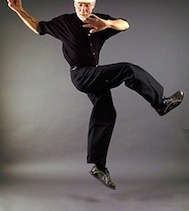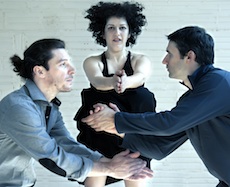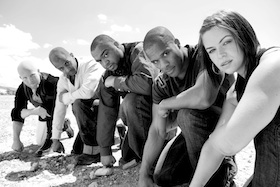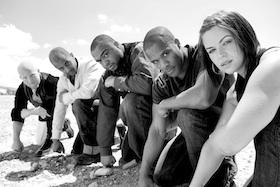
Photo courtesy of Crosspulse
Back in primordial times, our mammalian ancestors communicated primarily through voice, body, and other senses. Apes spoke volumes when they stood tall, pounded their chests, and screeched in tones that reverberated through the jungle. Millennia later, these extremely visceral sounds still resonate through us on the most elemental levels. “Body music is the oldest music,” says International Body Music Festival (IBMF) founder and artistic director Keith Terry. “People respond to it out of genetic memory. It seems to trigger past memories. Its simplicity is also an antidote to all the high-tech arts that are being created these days. It’s so totally unplugged.”
It’s also extremely diverse in its cultural manifestations. Terry’s fourth annual festival, which follows last year’s celebration in Sao Paulo, Brazil, features six days filled with over 20 presentations of traditional and contemporary Body Music styles from the U.S., Brazil, Indonesia, Turkey, Canary Islands, Greece, Canada, and what Terry calls “other popping, stomping, humming corners of the world.”
Featured Video
One definite homegrown innovator is Terry’s Slammin All-Body Band. Specializing in the rhythms and vibes of urban Oakland, its new combinations of jazz, R&B, soul, hip-hop, and other happenin’ sounds (hopefully minus the gunfire) are helping evolve the ancient art form to new levels.
Another of Terry’s projects is Oakland’s SlamDance, which performs a rowdy mix of a cappella singing, beat box, and tightly choreographed Body Music deeply rooted in jazz, funk, and world music grooves. Some SlamDance pieces feature the IBMF house band, the Slammin Rhythm Trio, which performs its own combination of Body Music, beatboxing, and bass vocals twice at the Yerba Buena Center for the Arts Forum (Friday, Nov. 4 at 8 p.m., and at a Family Matinee on Sunday, Nov. 6 at 2 p.m.)

Photo by Simone Mongelli
“The whole thing about body music is that you’re a dancer and a musician all in one,” says IBMF Assistant Director, SlamDance member and Oakland resident Evie Ladin. “SlamDance adds choreography to the mix of vocals and body percussion. And the word “slammin” indicates that we work in a lot of odd time signatures derived from jazz and world music.”
A particularly fascinating IBMF-commissioned hybrid (Nov. 4) unites Ladin with Sandy Silva of Montréal and Nic Gareiss of Michigan and Ireland. With some assistance from Éric Beaudry of Montréal, the group will merge Ladin’s Southern Appalachian style flatfoot clogging with Silva’s Celtic and Gareiss’ Irish styles. If that in itself sounds exotic, note that Ladin, inspired in part by lessons with her International Folk Dance teacher mother, also draws on the hand bone and African-American body percussion styles that lie at the root of the southern Appalachian tradition.
But that’s only the start of the festival’s diverse offerings. While Molodi of Las Vegas may meld more commercial styles of Cirque du Soleil and Stomp with African-American Steppin that developed in African-American college sororities and fraternities, the five members of Istanbul’s Kekeça (Nov. 5) have roots in Turkish folk music. Terry characterizes their art as “slow, groovy, with odd times signatures: It’s like water flowing.”

Photo courtesy of IMBF
A further contrast comes in the form of Fernando Barba of São Paulo, Brazil, who translates samba and maracatu into faster, harder edged body sounds. Lovers of Stravinsky’s angular rhythms may feel especially at home with Greek ensemble Kantu Korpu.
The International Body Festival won’t return to the Bay Area until 2013. Next year it heads to Istanbul, where money from the city’s government and additional funds from the U.S. State Department (ironically unavailable for performances within the United States) make possible a far bigger and more elaborate Body Music celebration.
The time to immerse yourself in an art form that promises to influence far more classical musicians than Bobby McFerrin is now. Given that the Yerba Buena Forum only seats 350, tickets will surely sell out.

